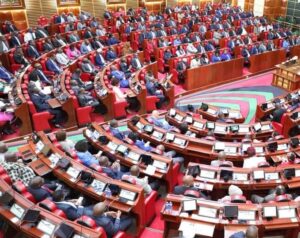Kenya is facing a serious test of democracy as Members of Parliament push amendments to the Computer Misuse and Cybercrimes Bill, 2024 that will hand sweeping powers to the state and its agencies. The changes being fronted are not simply about fighting online crime as MPs want Kenyans to believe.
They are a direct assault on freedom of speech and open the door for abuse by leaders who have consistently shown intolerance to criticism. The Bill, which has already seen sections passed by MPs, introduces provisions that allow digital devices, websites, and entire systems to be disabled or deactivated if they are linked to what the authorities call illegal activities.
On paper this sounds like an effort to tackle terrorism, child exploitation, or fraud. In practice, it gives lawmakers and government agencies the power to decide what is illegal and silence whoever they want.
Section 46A of the amendments is at the heart of the controversy. It gives an “authorised person” such as law enforcement officers or cybersecurity officials picked by the Cabinet Secretary for National Security the right to apply to court to order the removal or deactivation of online platforms, websites, or devices.
While they claim it will be subject to court approval, the reality is that Kenya’s institutions are weak and the same political forces behind this law already influence the judiciary.
This effectively turns MPs and the executive into judges of free speech. Instead of protecting Kenyans, Parliament is creating a weapon that will be used to stifle dissent, muzzle journalists, and target whistleblowers.
Lawyer Evance Ndong has already moved to court challenging the amendments, pointing out how vague and unconstitutional some clauses are. He has questioned terms like “extreme religious and cultic practices” that are poorly defined and can be stretched to fit anything those in power want to criminalize.

Members of Parliament during the past session. Photo Courtesy
His concerns reflect what civil society groups and digital rights activists have been warning: that Parliament is sneaking in dangerous powers without genuine public participation.
The manner in which the amendments were introduced, with little debate and scant involvement from the public, shows just how deliberate MPs have been in shielding themselves.
The National Computer and Cybercrimes Coordination Committee is also set to be expanded with powers to order the blocking of websites and apps. This committee, under the control of the executive, will be another arm to silence critical voices.
Cabinet Secretary for National Security, who will oversee authorisations, is being given more control over the digital space, a clear indication that this is less about cybersecurity and more about consolidating political power.
Members of Parliament pushing this Bill must be called out. They are not acting in the interest of Kenyans. They are legislating for themselves, creating tools that will protect their corrupt dealings from exposure.
Their record speaks for itself: they resist accountability, fight lifestyle audits, and ignore scandals.
Now they want the power to shut down any voice that questions them. This is a betrayal of the people who elected them and an attack on constitutional freedoms.
Kenya risks sliding into digital dictatorship if this law takes root. It will not only silence criminals as the MPs pretend. It will silence the youth mobilizing on X, the journalist uncovering theft of public funds, the activist in the village fighting land grabbing, and every ordinary Kenyan who dares to speak truth to power.
Parliament and those leading these amendments must be held responsible. They are opening the door for abuse, and if Kenyans remain silent, the price will be the death of free expression.
MPs were elected to serve the people, not to gag them. It is time citizens confronted this betrayal before the country loses its voice completely.



